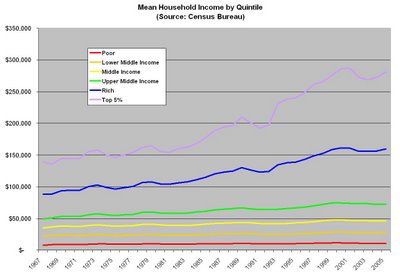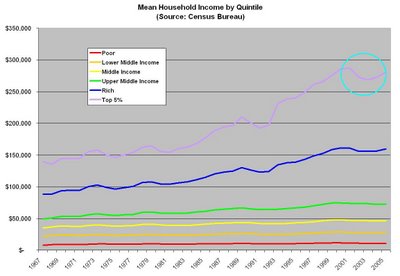One is the natural gas production at Bolivia's state owned government agency (as I wait, patiently crouched like a ninja ready to jump upon the inevitable data that will show production has declined under state ownership).
The second is the mean household income of each quintile of income earners put out by the US Census Bureau.
The latest data had only gone up to 2001, and I was particularly interested in this information because it would ABSOLUTELY AND COMPLETELY resolve one of the main (if not THE MAIN) claim of the left that George Bush's tax cuts have only benefited the rich. So imagine my joy when I found out they had updated them to 2005 this past week!
Well junior and aspiring deputy economists, here's the latest income distribution figures from the US Census Bureau;

As you notice the long term trend of EVERYBODY'S income is that EVERYBODY, POOR INCLUDED is getting richer. However, the short term trend, since the economic slow down of 2001 (I still refuse to call it a recession) is that people have been getting poorer, with a recent recovering in income.
Now, leftists, socialists, communists and other mainstream members of the democratic party, will pounce on this as proof positive that GW's policies have failed since he was inagurated as president in 2001. That he is out there whooping it up for his rich oil buddies, and when he's not whooping it up, he's sending his storm troopers out to knee-cap poor people.
But there are two problems with this;
1. It seems that it's more a historical economic trend for incomes to decline (and then recover) after each recession, rather than Bush training Barney to bite and pee upon poor people. I circled in light blue what has happened to the bottom 4 quintiles of incomes after the previous three "recessions" and you'll note that the trend is consistent across all incomes.

After each recession, ALL PEOPLE'S INCOMES DECREASE...LIKE YOU WOULD EXPECT THEM TOOOO, MAYBE HUH?????
2. The left likes to focus their attacks on the "super rich" because they know they can tax such a small minority, promising the masses to transfer the wealth and thus bribe poorer folk to vote for them. Well, even the "super rich," GW's presumed "bestest of buddies" suffered. With not only the top 20% of income earners suffering a decrease in income, but also the tippy top super secret elite top 5% of income earners suffering a loss as well.

So there you have it folks. The answer to the brainwashed, massed produced, broken record mantra of the left, "GW's tax benefits have only benefited the rich," is
"No it hasn't, it seems to have had the same effect on all income levels, besides which the broader economy seems to have a larger role in determining outcomes."
Now, a signed autograph and CERTIFICATE OF JUNIOR DEPUTY ECONOMIST-NESS goes to the adventuresome aspiring economist that can tell me why incomes of the lowest quintile have not recovered as quickly as other quintiles.
12 comments:
Because the people in the bottom quintile either don't work, or don't work full time. And if you don't work, you don't make more money.
Should you be graphing those on a logarithmic scale? I think if you did you'd get a more reasonable graph. We don't care so much what the absolute values are as much as what the change in them is. (Which a logarithmic scale should show us a little better).
Hey Enrique,
Well, no, because if they didn't work, they wouldn't even been in the income figures. These people are working, there's just a reason their incomes have not recovered as quickly.
And yeah, we could do it logrithmically, but I think leaving it unadjusted kind of provides insight in its own as to how much (quantitatively speaking) people make more/less than others.
Keep guessing though!
Hmmm. how about this. The people at the bottom tend to not have investment income.
Investment income, stocks,are much more responsive to changes in the economy than wages. Investment income reacts right away and goes up right away.
Wages react too but more slowely so the bottom quintile get thier's later.
Could be, but that's not it.
There are two things, closely related however, that are depressing lower wages earner's incomes.
One reason is the immigration of low-skilled hispanic workers, which raises the supply of labour for low-skilled, low-paid jobs, mainly in the service sector. The second reason could be the manufacturing sector's outsourcing of jobs to China, thereby decreasing demand for labor, and wages, in the US.
Could it be the fact that upper income earners are more likely to take advantages of changes in the market as they are first happening? After all, there's a reason they got into that particular bracket in the first place, and it seems unreasonable that they would abandon practices that made them successful. So, as a market slowdown ends, the upper income earners take note of this quickly (and firstly), and react accordingly to capitalize on this. Because they aggressively seek out opportunities to take advantage of and do so, their incomes recover faster than that of lower income earners, who do not look for and react to market changes as quickly.
The only thing I can think of: As the economy starts to expand again, bottom level positions open up, therefore there is an increase in the numbers at the bottom.
Hey All,
Sorry for the cliff hanger, but dtrum got it. Right on the nose.
Thanks for all that played! dtrum, e-mail me a mailing address and I'll send you your very own signed Certificate of Economist-Ness!
And...what of Bolivian natural gas production?
Still waiting on Evo to post the figures. though I don't think he will for it would prove his ineptitude as a llama farmer and not a natural gas exec.
No offense, but I'm not seeing any income growth for the lower 4 quintiles in the first graph. I don't think doing it logarithmically would help.
In fact, the growing divide has been the debate recently among several (PhD) economists' blogs. The right-leaners saying that it represents a higher return to education and skill, the left-leaners saying it's because of Bush policy favoring the rich.
Post a Comment